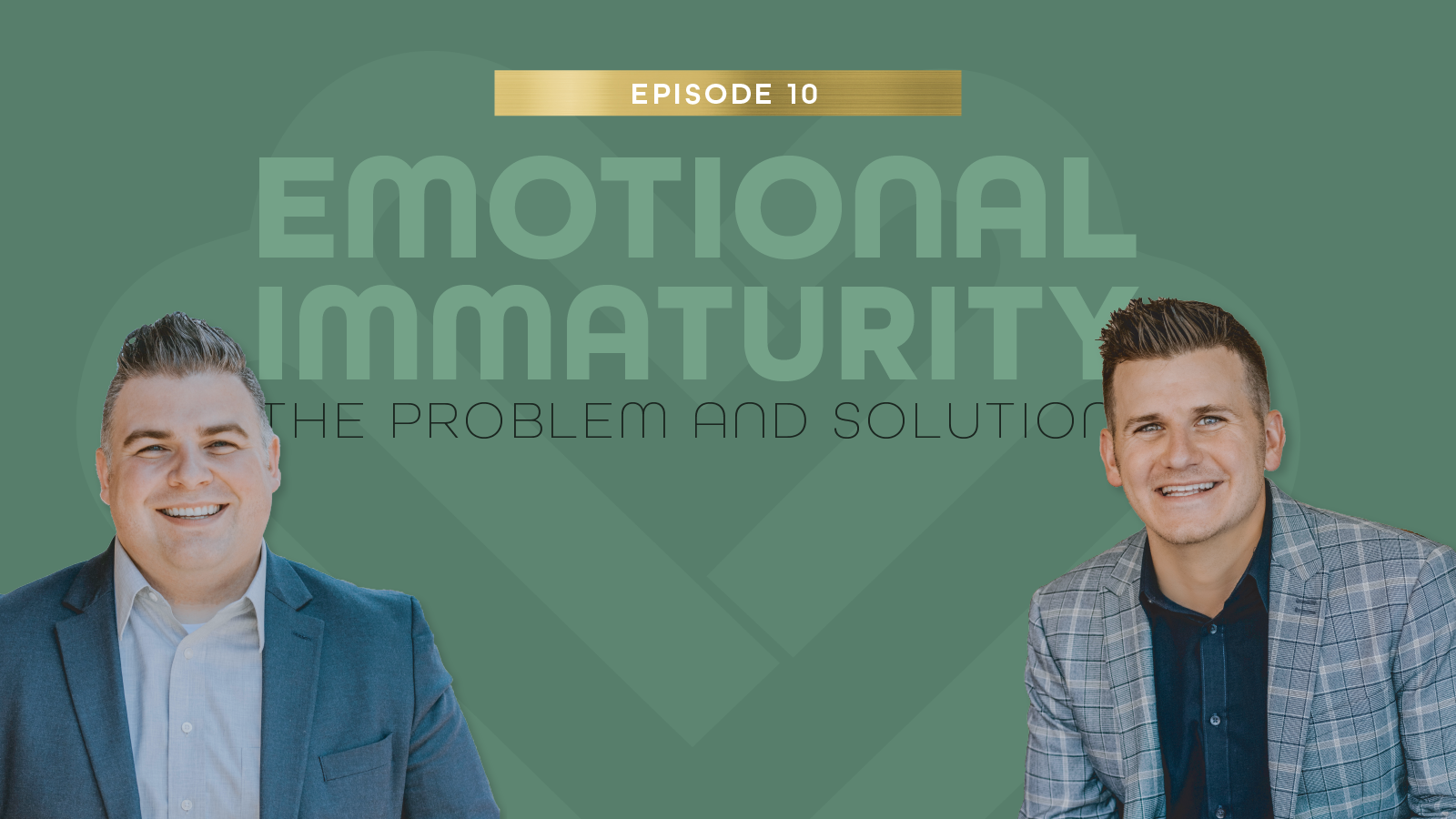Emotional Immaturity
Hello again, everyone! Jeremy Gilliam here today with Taylor Kovar, as we present a hot topic nowadays: emotional immaturity. Basically, it’s our ability to identify and control our emotional responses in intimate relationships.
Because that’s what gets us in trouble a lot, right? Our emotions. But hey, we’re only human; sometimes, those pesky feelings get the best of us.
But that’s where the “maturity” aspect comes into play—when you’re able to understand how you feel and how you want to react, but for the sake of the situation at hand (as well as your marriage), you respond in a more appropriate manner.
Tough conversations usually bring out the emotional immaturity of a person, and that immaturity is what creates and feeds the conflict—not the topic itself.
It’s not the disagreements that are the challenge, it’s our emotional reaction to those disagreements. Nobody necessarily wants to have those more complex conversations, but it’s important to pull out the shovel and start digging!
A lot of people hesitate to even bring certain things up, or even avoid them altogether, because they already have thoughts of how the conversation is going to go.
…I know it’s going to lead to an argument…
…They’re going to get super defensive…
…We’re not going to get anything accomplished, anyways…
…I’ll just leave it be.
We want you and your spouse to be able to move past those irrational thoughts and bad habits of not communicating in the way you should. The only way to solve a problem is to man (or woman) up, be mature, and get down to the nitty gritty. Why let something continue to fester for hours, days, even years on end, when it’s doing nothing but placing further stress and complications on your relationship?
As always, communication is key. But if you’re not managing your emotions and responding in the correct way, what good is communicating at all, for either of you?
Luckily, we’ve got a few critical points to get you on the right track for working on your own emotional maturity.
Self-Responsibility
This, we believe, is the first step in becoming emotionally mature. Take responsibility for yourself! Yes, you are responsible for your actions externally, but this also goes for what’s going on internally. Only you can control your reactions and perception.
This becomes challenging because, when people get emotionally hijacked, they get flooded. By that point, they’re using the most primitive part of their brain instead of actually thinking and making logical decisions. The result? Reacting instead of responding.
It’s easy to let emotions rise, bubble to the surface, and spill over in a mess. Emotional maturity ensures that we check ourselves first, before letting our emotions do the talking.
*The following sections are known as The Four Points of Balance in managing your thoughts, feelings, and interpersonal relationships. Credit is given to marriage/family therapist, the late David Schnarch, for their creation.
Solid, Flexible Self
In order to control emotions and increase maturity, be solid in yourself. Some people can’t grasp a true, solid identity of themselves on their own, so they seek to fill that space with a reflection of how others see them.
In cases like arguments or disagreements, we may feel like our world is crushed, because if our spouse is viewing us negatively and painting us in a bad light, that’s how we see ourselves as well.
Know who you are, your values and self-worth, why you stand for your particular opinions, why you think what you think. The “flexible” part allows you to be comfortable in your position, allowing you to have two feet to stand on, while still allowing room for your spouse in the relationship.
Quiet Mind, Calm Heart
You have two parts: your thoughts and your feelings/emotions. When emotions get in the driver’s seat, we don’t know what to do. Our heart rate skyrockets through the roof, and before long, our prefrontal cortex (the thinking part of our brain) shuts off. Then we wonder why we’re not making any headway with our spouse in the conversation.
A quiet mind and a calm heart is knowing the difference between an emotional response and a logical response. Only you can control your physical reactions to both. Learn to soothe your own mind and heart, and let go of the anxiety you may be carrying with you, so you can respond in a way that’s beneficial—not harmful—to the situation.
Meaningful Endurance
This one’s about tolerating discomfort for potential growth. Think about it: in anything, success doesn’t come easily. A few bumps, bruises, and hardships may occur along the way. You wouldn’t be where you are today without endurance.
Conflict and tough conversations bring discomfort, but withstanding it all and moving forward allows you to grow together. This relationship with your spouse should be meaningful in a way that you can tolerate whatever’s uncomfortable, because you’ll always feel so much closer to each other afterwards.
Sometimes we may forget that a marriage requires continuous work. You don’t get married and suddenly become perfect; you still have to till the land and plant the seeds before you can reap what you sow.
Emotional Immaturity & Grounding
This is kind of like a three-way scale concept: on one end, you have underreacting, and on the other, you have overreacting. In the middle is a grounded response.
Overreacting isn’t an appropriate response to any situation. These include reactions such as blowing a fuse easily, always yelling, falling to pieces for no reason, and so on.
On the other hand, underreacting isn’t right, either. Reactions like avoidance, lightly shrugging conflict off, and showing no emotion in situations that warrant an expression fall under this category.
Don’t explode, and don’t just sweep things under the rug. Always aim for the more controlled “middle ground” of a mature, emotionally grounded response. Make a logical decision based on what’s happening, and act in a way that doesn’t escalate or undermine the situation at hand.
Remember…
…you CAN have a thriving, successful, healthy, and happy marriage, but it’s not going to happen overnight. It’s possible to change your direction overnight, but you’re not going to change your destination as quickly.
The same thing goes for improving your emotional immaturity. It’s not just the flip of a switch; it takes practice and a lot of work, but the more you work on it, the better it’s going to be. Make yourself not only a better individual, but a better spouse. The rewards will be tremendous.
As always, Taylor and I want to be the voices that are able to guide you to a better marriage and life, and hand you the tools and resources to do so. There’s always help out there. Reach out to us with whatever you may need, and we’ll do our best to get you pointed in the right direction.
Don’t forget to like us on Facebook! And click here to check out our episodes in podcast form.


